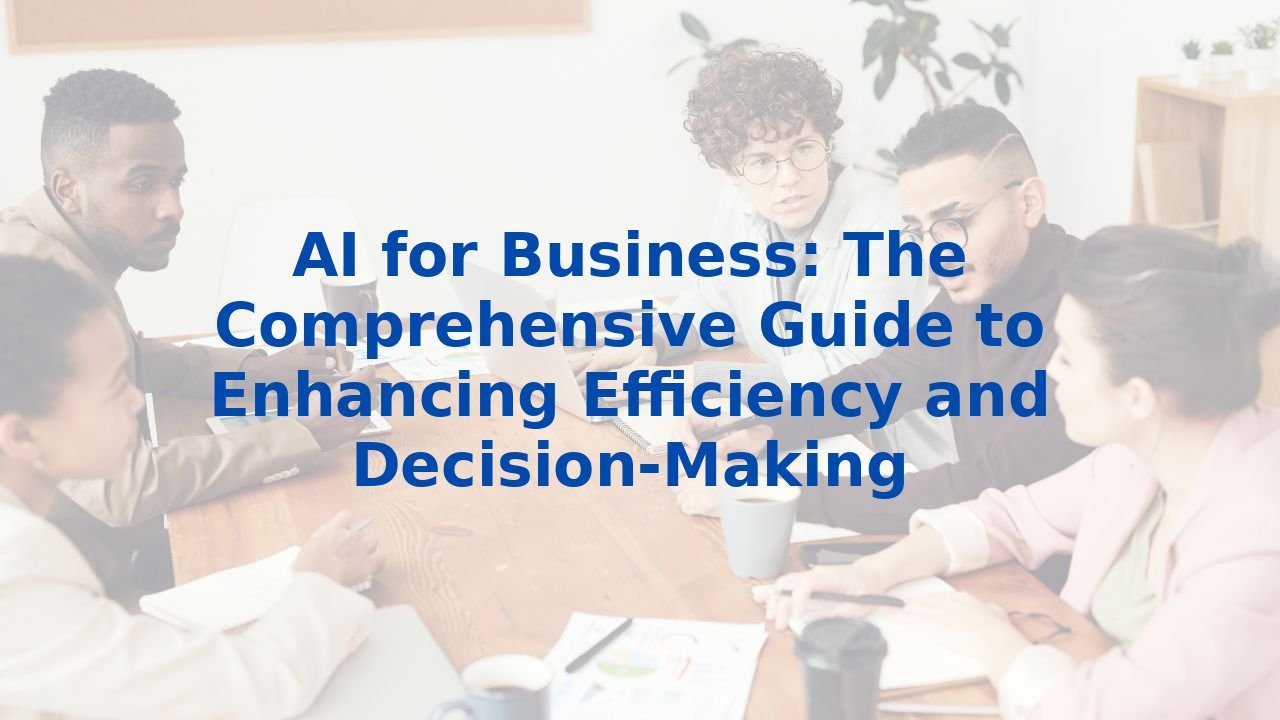AI for Business: The Comprehensive Guide to Enhancing Efficiency and Decision-Making
AI for Business: The Comprehensive Guide to Enhancing Efficiency and Decision-Making
Introduction
In an age where every second counts, efficiency is not just a goal; it’s a survival strategy. Enter artificial intelligence (AI)—a game-changing force that is redefining the landscape of business operations. By optimizing processes and enhancing decision-making, AI is not just a tool, but a transformative ally for organizations aiming to thrive in a competitive environment. Let’s explore how AI can revolutionize the way businesses operate.
1. Automating Routine Tasks
The repetitive grinding of manual tasks is a drain on human resources. AI swoops in here, automating routine operations and liberating employees from mundane duties. Consider the capabilities of intelligent document processing (IDP), which harnesses AI’s prowess to extract and process data from documents without human intervention. This not only streamlines workflows but also minimizes errors, allowing team members to shift their focus towards more strategic initiatives that require creativity and critical thinking.
2. Improving Decision Making
Imagine having the power to predict outcomes before making a decision. AI enhances decision-making processes by offering predictive recommendations based on data patterns. Through advanced analytics, AI models allow businesses to simulate scenarios—like adjusting pricing strategies—ensuring profitability and customer satisfaction. With AI crunching the numbers, decision-makers can tap into a reservoir of insights that lead to informed choices rather than educated guesses.
3. Applying AI for Process Optimization
Process optimization is where AI truly shines. Leveraging machine learning, AI analyzes vast datasets to unveil areas ripe for improvement, automating repetitive tasks and refining decision-making processes. Tools that engage in process mining sift through system logs to highlight inefficiencies, guiding organizations to automate high-volume data entry tasks and other repetitive work. This dynamic not only speeds up operations but also enhances overall accuracy and responsiveness.
4. Real-Time Monitoring and Process Improvement
The ability to monitor processes in real-time is a game-changer, allowing companies to address challenges as they arise. With AI-driven process mining, organizations receive up-to-the-minute insights about their operational status, which opens the door to rapid intervention. Whether it’s solving an emerging issue or capitalizing on a fleeting opportunity, real-time monitoring transforms potential obstacles into avenues for improvement.
5. Complex Decision-Making Support
As decisions grow more intricate, so does the need for comprehensive information. AI lays the groundwork by providing extensive data analysis, simulating alternative scenarios, and suggesting optimal courses of action. By integrating structured and unstructured data from multiple sources, AI identifies patterns that may otherwise go unnoticed. This integration is a boon for decision-makers navigating the complexities of today’s business landscape.
6. Automating Process Decisions
Quick, accurate decisions are vital in a fast-paced environment, and AI can help achieve this autonomy. By automating decisions based on predefined rules or algorithms, organizations can speed up response times and minimize errors, streamlining operations across departments. The result? Enhanced operational efficiencies and a competitive edge in the marketplace.
7. Predictive Analytics and Risk Management
Protecting the organization from potential pitfalls is as critical as pursuing growth opportunities. AI excels in predictive analytics, enabling businesses to foresee future processes and outcomes based on historical data. This proactive stance on risk management allows companies to identify bottlenecks, respond swiftly to market fluctuations, and make informed adjustments to their operations.
8. Enhancing Customer Service
Customer service is another arena where AI makes significant strides. Through chatbots providing immediate responses to inquiries and sophisticated analysis of customer feedback, businesses can proactively enhance their service quality. AI-driven systems can categorize and prioritize incoming customer requests, allowing human agents to focus on more complex issues. This synergy of AI and human effort leads to elevated customer satisfaction and loyalty.
9. HR and Sales Process Optimization
AI’s integration into HR processes transforms recruitment, enabling data-driven decisions about candidates by analyzing performance metrics and market trends. In sales, AI automates administrative work and offers insights on the most effective sales channels. This leaves sales teams free to forge relationships and convert leads, multiplying opportunities for revenue generation.
10. Training Employees for AI
To fully unlock the potential of AI, organizations must invest in training their workforce. Understanding AI tools and the data-driven insights they offer is crucial for maximizing their benefits. A well-trained team not only embraces AI but also leverages it to enhance organizational productivity. Tailored training sessions can provide employees with the skills they need to thrive in AI-enhanced roles, ensuring maximum efficiency across the board.
Conclusion
The advent of AI is ushering in a new era of business operations where efficiency is paramount. By automating routine tasks, enhancing decision-making, and optimizing processes, AI lays a solid foundation for organizations striving for excellence. From predictive analytics to real-time monitoring, AI transforms operational landscapes, empowering teams to focus on what truly matters. Investing in training for your workforce amplifies these gains, ensuring that AI becomes an integral, effective part of the organization’s strategy. As we navigate this new world, those who embrace AI will not just survive but thrive.



